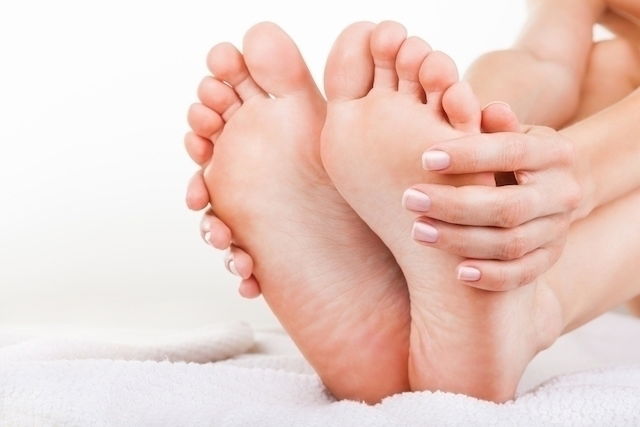Burning feet is a painful sensation that usually happens as a result of nerve damage in the legs or feet. This can occur with conditions like diabetic neuropathy, nutritional deficiencies or infections.
Also known as burning feet syndrome or Grierson-Gopalan syndrome, burning feet can worsen at night and present with other symptoms, like discomfort, heaviness, numbness or sharp pain.
If you experience burning feet very frequently, you should see your doctor for assessment and treatment as necessary. Treatment will depend on the underlying cause of the burning, although the doctor may advise comfortable shoes, increased physical activity or diet changes.

What causes burning feet?
The most common causes of burning feet are:
1. Peripheral neuropathy
Peripheral neuropathy is a condition that affects the peripheral nerves, causing pain, tingling, burning, cramps or muscle spasms.
This condition is more common in people with diabetes, but can also be caused by trauma, nerve compression, rheumatoid arthritis or Guillain-Barré syndrome.
How to treat: If peripheral neuropathy is confirmed, the doctor may prescribe the of analgesic, anticonvulsant and antidepressant medications to manage symptoms.
Your doctor may also recommend applying capsaicin ointment or a lidocaine patch to your skin to help relieve nerve pain.
2. Erythromelalgia
Erythromelalgia is a rare disease caused by inadequate dilation of the blood vessels in the skin, causing numbness, pain and burning in the feet, hands and legs.
How to treat: it is essential to consult a hematologist or neurologist, who may prescribe antidepressants, oral or topical anti-inflammatories, and patches or ointments containing capsaicin or lidocaine.
Some patients may also benefit from applying cold compresses to reduce heat, avoiding hot environments, and staying upright.
3. Diabetic neuropathy
Diabetic neuropathy is characterized by nerve damage that decreases sensitivity in several areas of the body, mainly in the hands or feet. Many patients report tingling, pain or burning, which can happen with poorly managed diabetes and frequently high blood sugar levels.
How to treat: You should see an endocrinologist or neurologist to indicate the best treatment plan. which may involve controlling sugar levels through diet and insulin, as well as physiotherapy and acupuncture to relieve sensitivity and burning in the feet. Check-out some tips for lowering blood sugar that you can incorporate into your treatment plan.
4. Plantar fasciitis
Plantar fasciitis is an inflammation of the fascia, which is a fibrous tissue located at the bottom of the foot. Inflammation can cause symptoms like pain at the bottom of the foot, as well as burning or discomfort when walking or running. This condition is more common in people who are overweight, athletes who engage in high-impact activities (like long-distance running), people who wear high heels for prolonged periods, or people with a history of arthritis or a foot fracture. Read more about the symptoms and causes of plantar fasciitis.
How to treat: You should consult an orthopedic surgeon or rheumatologist, who may recommend orthopedic insoles and physiotherapy to improve your symptoms. You should avoid standing for prolonged periods, and decrease the intensity of workouts, like running.
5. Poor circulation
Poor circulation, also known as arterial or chronic venous insufficiency, is when the blood is unable to flow in adequate volumes to the lower extremities. This can cause pain, swelling, numbness, and burning in the legs and feet. Usually, symptoms worsen throughout the day, the more you stand on your feet, but tend to improve when you elevate your legs.
Read more about poor circulation in the legs and what can cause it.
How to treat: To treat poor circulation, you should see a vascular surgeon for assessment. He or she may recommend compression stockings and anti-inflammatory medications to improve circulation symptoms. You are advised to avoid using high heels and standing for hours at a time, as this can contribute to swelling, pain and burning in the legs and feet.
Also recommended: Tingling in Feet: 14 Common Causes & What to Do tuasaude.com/en/tingling-in-feet6. Foot changes
During the day, the feet can be overloaded with weight due to intense physical activity, inappropriate footwear or changes to bone or muscular structure, like a flat food, bunions Charcot-Marie-Tooth disease, or callouses. All of these conditions can cause pain and burning, especially at the end of the day.
How to treat: You should book a consult with an orthopedic surgeon to assess your symptoms and indicate the best treatment. Treatment can include physiotherapy, topical or oral medications, changes to footwear or insole use. All of these interventions can decrease pain and burning in the foot muscles and bones.
7. Infections
Infections caused by herpes, shingles, or HIV, for example, can cause peripheral nerve inflammation, which can lead to pain, tingling and burning feet.
How to treat: You are advised to follow treatment as prescribed by your doctor, which may involve the use of medications to treat the underlying infection. Prescribed medications can include antivirals, to combat the infectious agent, and analgesics or anti-inflammatories, to relieve symptoms.
8. Rare syndromes
Some rare syndromes, like erythromelalgia (which happens due to blood vessel abnormalities), and Guillain-Barré syndrome (in which nerve cells are attacked and damaged), are associated with burning feet, as well as numbness, redness and discomfort in the hands, legs and feet.
How to treat:Treatment should be managed by a hematologist or neurologist, who will advise treatment as indicated for the diagnosed syndrome. Patients may be prescribed anti-depressives, anti-inflammatories or physiotherapy.
9. B-complex vitamin deficiency
A lack of B-complex vitamins, like B1, B6 or B12 deficiency, can cause peripheral neuropathy. These deficiencies can cause nerve damage, leading to decreased sensitivity, tingling, numbness and burning feet or hands. See what can cause a B12 deficiency and the symptoms associated with this condition.
How to treat: Treatment for a vitamin deficiency is normally managed by a doctor or registered dietitian. The health care professional will likely recommend supplementation for at least 6 months. You should also make some diet changes and increase your intake of food that is rich in the vitamin you lack.






























